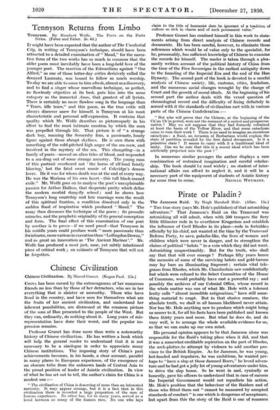Tennyson Returns from Limbo
Tennyson. By Humbert Wolfe. The Poets on the Poets Series. (Faber and Faber. 3s. 6d.)
Ir might have been expected that the author of The Uncelestial City, in writing of Tennyson's technique, should have been attracted to a detailed examination of " Maud," for the narra- tive form of the two works has so much in common that the older poem must inevitably have been a long-held love of the younger poet. The reaction of the Edwardians against " Our Alfred," as one of those latter-day critics derisively called the decayed Laureate, was bound to follow so much worship.
To-day we are able to come to him afresh, almost as a discovery, and to find a singer whose marvellous technique, so perfect, so flawlessly objective at its best, puts him into the same
category as the immortal Anon, that greatest of all lyrists.
There is certainly no more flawless song in the language than " Tears, idle tears," and this poem, as the true critic will always discover anew for himself, is Tennyson at his most characteristic and personal self-expression. It contains that quality which Mr. Wolfe describes so picturesquely in his
effort to find the most intimate emotion by which the man was propelled through life. That picture is of "a strange dark boy, roaming the Somersby fens, a passionate, lonely figure against those abrupt skylines. He is seen there with something of the cold-pitched high anger of the sea-mew, and involved in the mystery of the sea. This changeling—in a family of poets—moved on alien tides of blood, and responded to a sea-drag out of some strange ancestry. The young man of this portrait overheard not ` the horns of elf-land faintly blowing,' but the fatal sweet music of Coleridge's demon lover. He it was for whom death was at the end of every way. He was the Mariana of his own heart—this tall black-maned exile." Mr. Wolfe goes on to analyse the poet's unexplainable passion for Arthur Hallam, that desperate purity which defies the modern morbid dung-fly school ; and he shows how Tennyson's long courtship and late marriage were the result of this spiritual fixation, a condition dissolved only in the sudden flood of inspiration which produced Maud." The essay then discusses the technique of the poem ; its prosodic miracles, and the prophetic originality of its general conception and form. The final effect of this examination of one poet by another is to prove—if we need proof—that Tennyson in his middle years could produce work " more passionate than Swinburne, more various in execution than " Loffingdon Downs," and as great an innovation as 'The Ancient Mariner '." Mr. Wolfe has produced a most just, sane, yet subtly intuitioned piece of critical work ; an estimate of Tennyson that will not be forgotten.


































 Previous page
Previous page